One-minute review
Robot vacuums that can mop as well as sweep have been available for a few years, but now there’s a new breed in town – robovacs that offer a scrubbing action as part of the mopping process, so they can remove ground-in stains as well as surface dirt.
Ecovacs is the latest brand to release such a model, the Deebot X1 Omni, which features two rotating mop pads that perform a scrubbing motion of 180 revolutions per minute to help lift stubborn stains from hard floors. It can vacuum or mop, or employ both functions simultaneously, while also being able to engage its spot-clean function for particularly dirty areas, making it one of the most hands-off robot vacuums we’ve tested to date.
The Ecovacs Deebot X1 Omni ships with a docking station that can clean and dry the mopping pads, and also empty and refill the 2.7fl oz / 80ml water tank. The docking station is also self-emptying, and can eject the contents of the 13.5fl oz / 400ml dust canister into a 0.55 gallon / 2.5-liter replaceable bag – meaning it really is possible to have a hands-off approach to floor cleaning.
The circular robot vacuum features a Lidar scanner and a HD camera to help it navigate around your home. The latter can also be used to keep an eye on your home when you’re not around – or, thanks to the microphone and speaker, to soothe your pets.
The Deebot X1 Omni will take a logical path when vacuuming, rather than a random route. In addition, Wi-Fi connectivity means it can be controlled via an app on your smartphone, or using your voice thanks to Ecovacs’ own YIKO voice assistant, which is built into the robovac.
At $1,549 / £1,499 / AU$2,499, the Ecovacs Deebot X1 Omni is one of the most expensive robot vacuums we’ve tested, but for those who want to completely outsource the chore of floor cleaning, including the scrubbing of hard floors, we think it’s worth the investment.
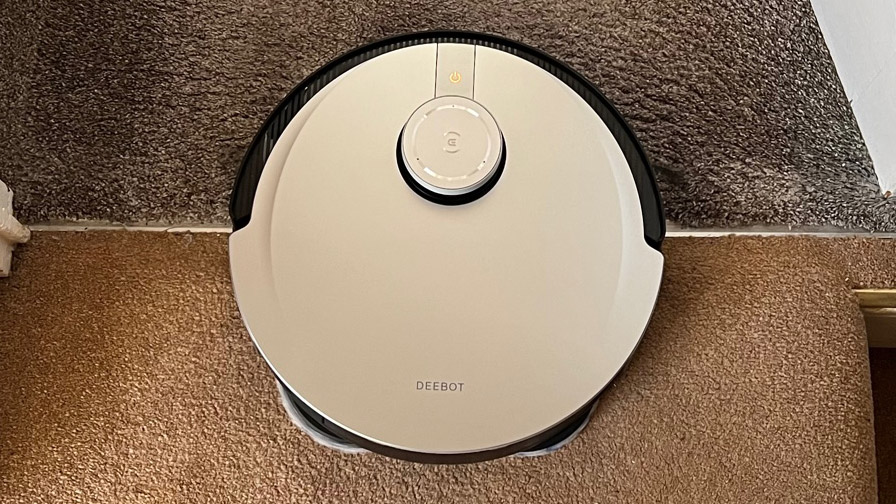
Ecovacs Deebot X1 Omni price and availability
- List price: $1,549 / £1,499 / AU$2,499
The Ecovacs Deebot X1 Omni costs $1,549 / £1,499 / AU$2,499, making it the most expensive robot vacuum we’ve tested to date. However, if you consider that it can mop floors – scrubbing them rather than simply sloshing water over them – and its self-cleaning, too, in our opinion this cost is justified. It’s available through Ecovacs directly or Amazon. It will be released in Australia in April.
The replacement dust bags will set you back $19.99/£22.39/AU$29 for three.
Ecovacs also offers the Deebot X1 Turbo, which also comes with a self-cleaning base, but it doesn’t offer the self-emptying function for the dust canister. It costs $1,349 / £1,299 / AU$2,299. Alternatively, the Deebot X1 Plus is a self-emptying vacuum and mop that can scrub at up to 600rpm, but it doesn’t support the automatic washing and drying of mopping pads. That model is priced at $1,149 (around £870), but it isn’t currently available in the UK or Australia.
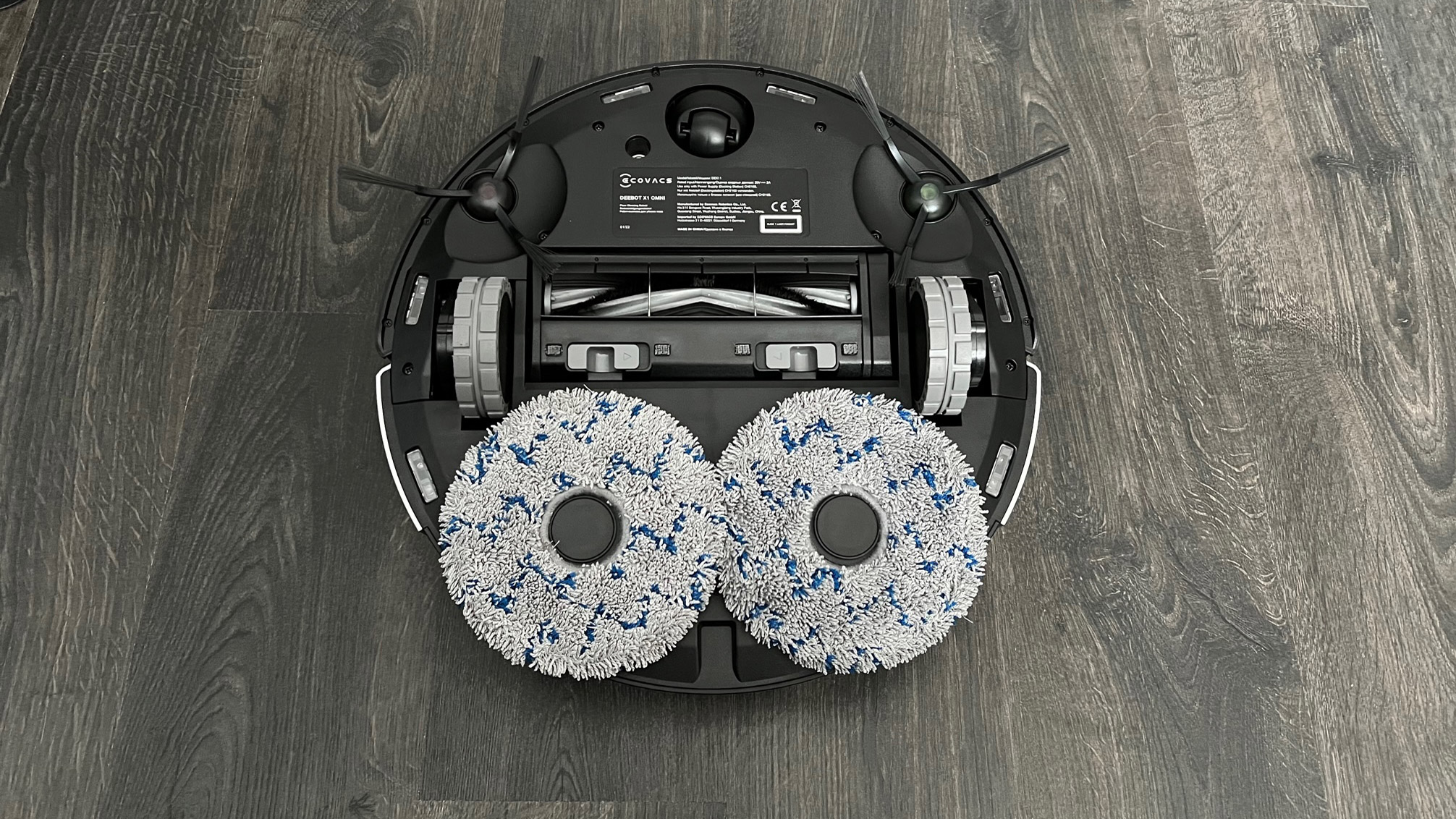
Design
- 13.5oz / 400ml dust canister and 2.7fl oz / 80ml water tank
- Built-in camera and Lidar scanner
- Self-emptying
Just like the majority of robot vacuums on the market, the Ecovacs Deebot X1 Omni is circular-shaped and measures 4.3 x 13.6 x 13.6 inches / 10.9 x 34.5 x 34.5cm (h x w x d). It’s slightly taller than some models on the market, but it didn’t have any issues maneuvering between chair legs or under furniture with low clearance.
The silver and black robovac features a plastic bumper surrounding the top half of the unit, alongside an HD camera to help it navigate around your home. It doesn’t rely on the camera alone, however. There’s a Lidar sensor, which is a 3.14in / 7.9cm wide by 0.79in / 2cm high disc that sits on the unit’s top, just below the power button, and a cliff sensor, too. That combo enables the robot vacuum to clean up to three different levels in your home in a logical pattern, and still be aware of exactly where it is in the cleaning process – while also avoiding plunging to the bottom of a flight of stairs.
The Deebot X1 Omni robot vacuum offers four levels of suction, three levels of water saturation and a 13.5oz / 400ml dust canister, which is located beneath the lid of the robot vacuum. However, unlike the iRobot Roomba J7 Plus or the Dreame Bot W10, for example, the lid here isn’t hinged – so rather than having to simply lift a flap for access, you’ll have to remove the whole lid. There’s also a 2.7fl oz / 80ml water tank located inside the robot vacuum for mopping.
Turn the Deebot X1 Omni over and you’ll find a swivel wheel at the front, plus two additional wheels on either side of the unit to help the robot vacuum to work its way around your home. Just like other robot vacuums, such as the Dreame Bot L10 Pro, the side wheels raise and lower, too, allowing the robovac to effectively clean a range of different surfaces.
As you’d expect, there’s also a brush that combines soft bristles with silicon fins to ensure debris from all surfaces can be collected. There are two side brushes, too, which can help sweep dirt from crevices into the vacuum’s path, and two removable 5.2in mopping pads.
Also part of the package is a docking station that charges as well as cleans the mopping pads, refills the water tank and empties the dust canister. It features two 4.2-quart / 4-liter tanks, one for fresh water and one for dirty water, as well as a 2.6-quart / 2.5-liter disposable dust bag, into which the debris from the dust box is automatically emptied. There’s even a space to store two additional mopping pads.
The docking station has three buttons that can start or stop the robot vacuum from cleaning floors; initiate a cycle that sees the mopping pads cleaned, the water tank refilled and the dust box emptied; or call the robot vacuum back to charge. However, at 22.8 x 17.6 x 16.9 inches / 57.8 x 44.8 x 43cm (h x w x d), this is the bulkiest docking station we’ve seen accompanying a robot vacuum.
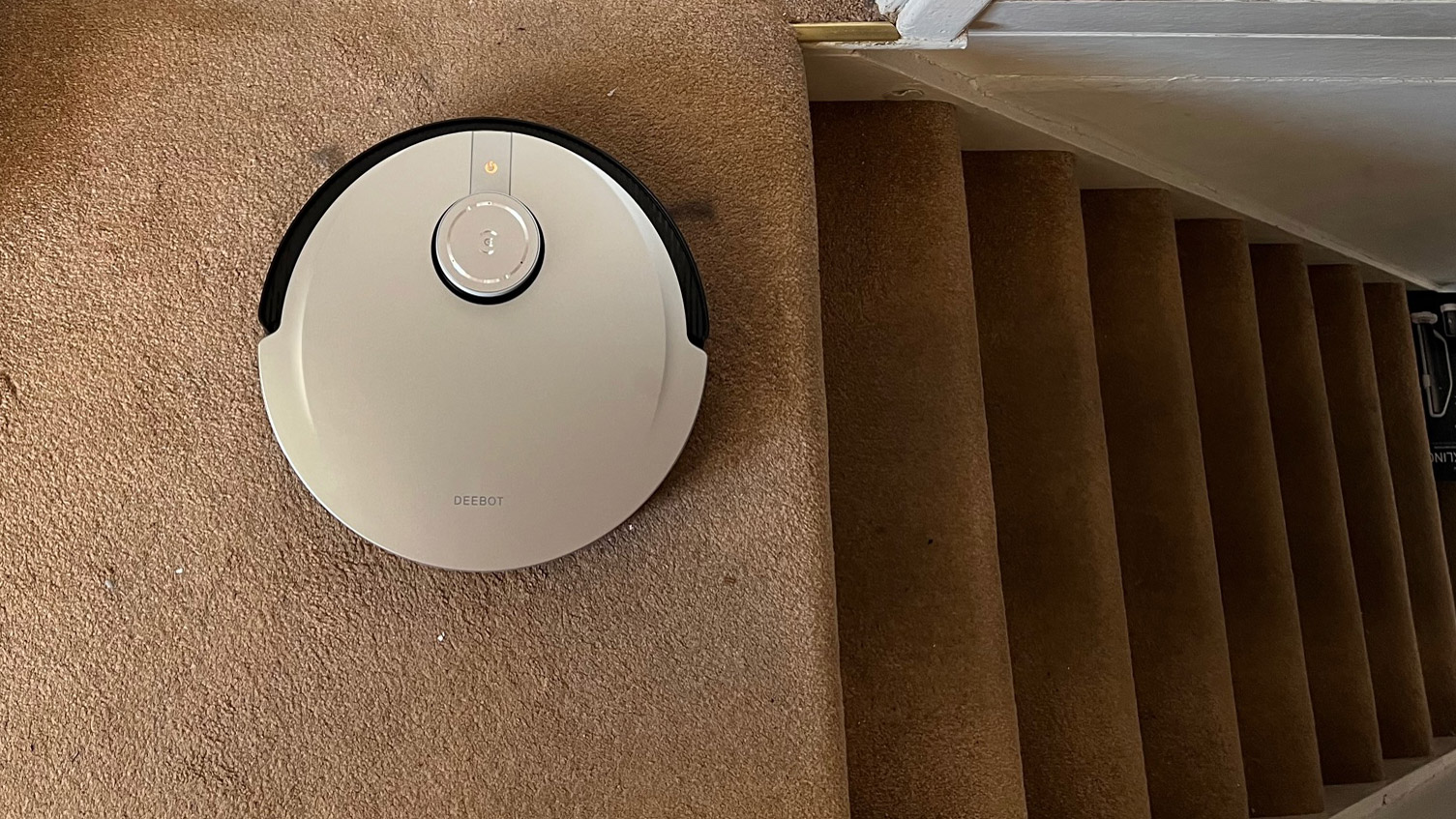
Performance
- Powerful suction
- Can scrub as well as mop
- Pleasingly quiet when emptying
The Ecovacs Deebot X1 Omni was extremely easy to set-up, and we liked that basic step-by-step instructions were included on the lid of the base station, so we didn’t have to hunt through the manual.
On the lowest suction, the robot vacuum was able to collect every last bit of fine dust, cookie crumbs and larger debris – including cereal – from hard floors. However, we did find that on hard surfaces the side brush had a tendency to scatter debris further around the room, which made the vacuuming process slightly longer than we’d hoped.
The Deebot X1 Omni was also able to suck up most fine dust and larger debris on soft floor surfaces, although the more powerful settings were required for giving carpets a deeper clean. We were impressed that the Deebot X1 can be set to automatically increase the level of suction on detecting carpet, boosting it from level one, dubbed Quiet, to maximum or Max+ during testing.
The Deebot X1 took a methodical route around our home, both when vacuuming and mopping, thanks to the Lidar sensor and camera. This combo also ensured the robot vacuum didn’t bump into furniture. However, it was a different story when it came to avoiding any obstacles placed in its path. It attempted to suck up both a charging cable and a sock. We also found the Deebot X1 regularly became stuck when moving from thick-pile carpet to hard floors, which meant we had to physically move the robot vacuum and restart the cleaning session.
As we’ve already mentioned, the mop function here does more than simply wet floors; the Deebot X1 Omni is one of the few robot vacuums on the market that can actually scrub them, too. As such, we found that this robovac coped just as easily for removing tough dried-on stains such as Coca-Cola and coffee from our hard floor, as it did fresh dirt. Note, however, that there’s no way to adjust the scrubbing intensity, unlike the Roborock S7 MaxV Ultra, for example.
We also found that unless the mopping pads were removed, the robovac would automatically return to its docking station if it detected carpet during its cleaning session.
The Deebot X1 Omni isn’t the quietest robot vacuum we’ve tested. Our decibel meter measured a maximum of 60dB when it was cleaning hard floors, rising to 70dB on Max+, and a few decibels quieter on carpet. This is the equivalent level of noise made by a shower.
However, it’s the opposite when it’s running its own cleaning processes on the dock. Our decibel meter recorded just 72dB when emptying the dust box into the docking station, and 62dB when cleaning the mopping pads – making it the quietest robot vacuum we’ve tested to offer such functionality.
Note that the dust box can be manually emptied – although, as we’ve already mentioned, this does require the lid to be removed first. However, with that done, we simply had to raise the handle and carry the dust box straight to the garbage. We liked that the handle kept the dust box upright, so no debris could fall from it.
The robot vacuum’s built-in camera can also be used to see and speak to anyone in its field of view. On test, viewing a live feed from the camera as the robot vacuum made its way around our home was mesmerising. The sound was clear when using the microphone and speaker to converse, also making it a great tool for soothing pets when you’re not at home.
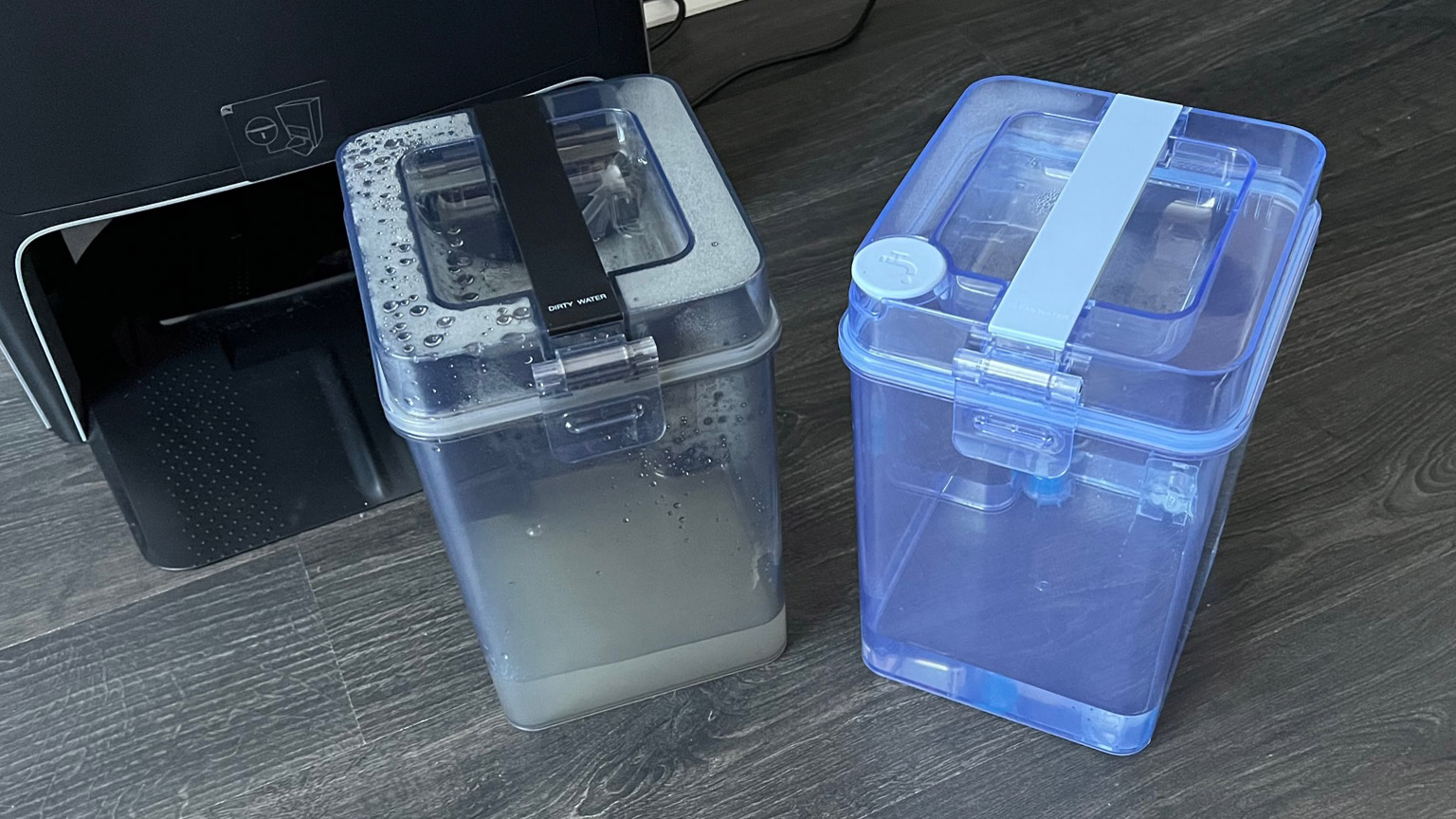
App
- Simple to use
- 3D Maps
- Voice control through YIKO
Like many of the companion apps for robot vacuum available right now, the Ecovacs app is simple to use. Once the robot vacuum is connected to your Wi-Fi, you can choose between either entering the cleaning menu or accessing the built-in camera.
The Deebot X1 Omni creates a map of your home as it cleans, which you can then split into different rooms and zones, allowing you to focus on specific areas rather than your whole home. With the ability to store three different maps, this robovac is ideal for multi-level homes, and we found it was able to map different levels even if the docking station wasn’t on them.
These maps can be viewed in 3D as well as 2D, and even allow you to assign floor material and add furniture such as TV stands, or beds, to the map.
Unlike many robot vacuums, the Deebot X1 Omni isn’t compatible with Amazon Alexa or Google Assistant, but that’s because it has its own voice assistant, YIKO (pronounced Ee-Koh), to start or stop a clean of floors, rooms or around specific items such as the sofa. On test, YIKO – developed in collaboration with Google – proved super responsive, for starting and stopping a clean, and adjusting the suction level.
Through the app you can also change the suction level of the robovac, along with the water saturation of the mopping pads, and schedule cleans, too.
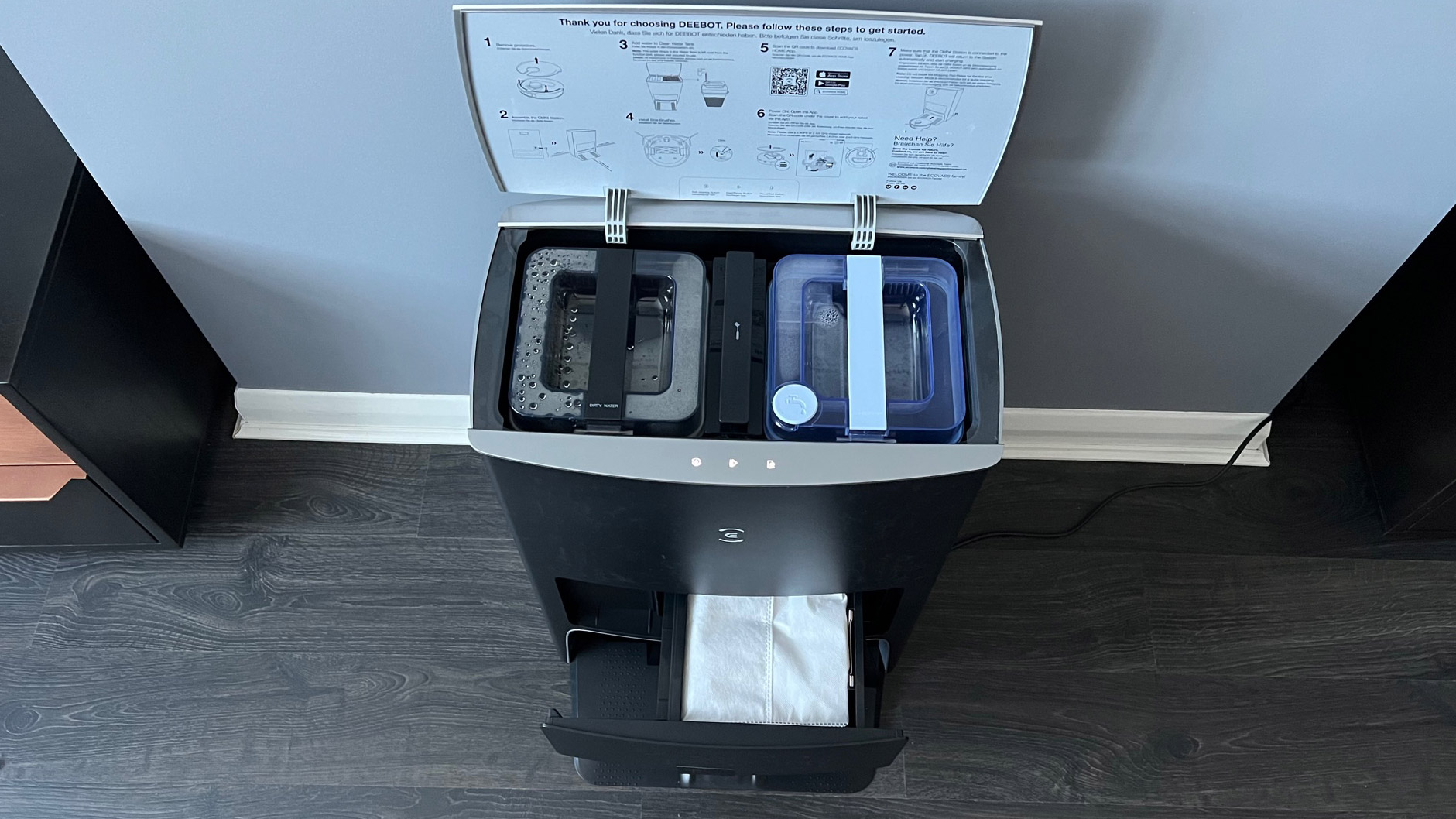
Battery life
- The battery lasts up to two hours and fifty minutes between charges
- It takes six and a half hours to fully recharge
- Clear battery level visible in the app
Ecovacs states that the Deebot X1 Omni will last up to two hours and fifty minutes between charges; however, note that this is in Quiet mode. On maximum power, the robot vacuum lasted for one hour and ten minutes, before needing to be recharged. However, this was sufficient to enable a full clean of a three-bedroom, two-storey house.
The robot vacuum will automatically return to the docking station when the battery drops below 15%, and if cleaning isn’t complete, it will continue the job once the battery is fully charged. Ecovacs says that in the future, the robot vacuum will get the same Smart Continuous Cleaning feature included with the Ecovacs Deebot Ozmo N8+, which will charge to a level sufficient to finish the job.
It takes around six and a half hours to fully recharge the Deebot X1 Omni, and we were impressed that there was a clear battery level, with a percentage, visible upon launching the app.
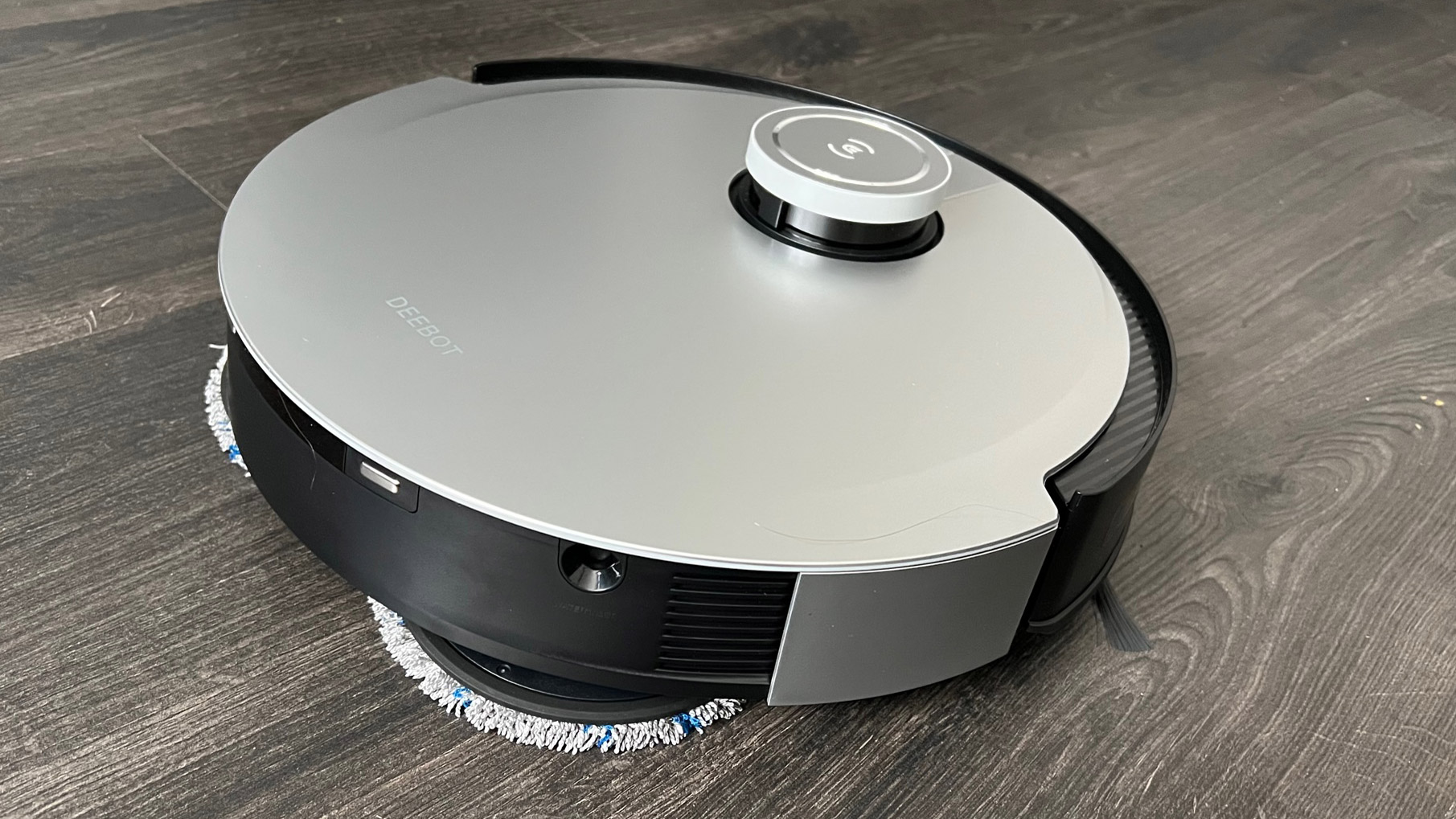
Should I buy the Ecovacs Deebot X1 Omni?
Buy it if…
Don’t buy it if..
First reviewed: March 2022




